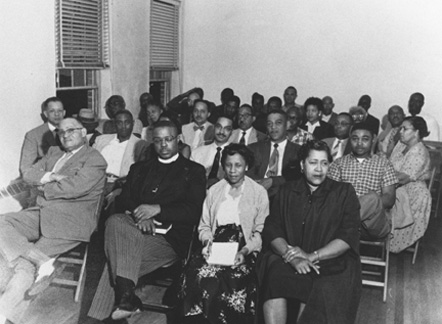Durham Committee on Negro Affairs
A meeting of the Durham Committee on Negro Affairs with John Wheeler, chairman of the Durham Committee from 1957 until his death in 1978, at far left, seated by the window and looking at the camera. Wheeler was an attorney, president of Mechanics and Farmers Bank, and a civil rights advocate, whose personal creed was, “The battle for freedom begins every morning.”
The Durham Committee on Negro Affairs was established in 1935, marking the beginning of the modern phase of the quest for civil rights in Durham. While accounts of its founding differ, all agree that C. C. Spaulding, head of North Carolina Mutual Life Insurance Company, called the first meeting and was elected first president of the group. In its early years the Durham Committee focused on 1) registering voters, with the city going from 50 registered black voters in 1928 to over 3000 (68% of eligible blacks) by 1939; 2) running black candidates for election to local office for the first time in 1938; and 3) getting blacks into elected and appointed positions traditionally reserved for whites. Progress was slow but sure as the DCNA won positions for blacks on commissions and boards and in a few public offices. Other achievements included a fire station staffed by blacks, hiring of the first African-American policemen, and establishment of recreational facilities for African Americans.
By the 1950s young blacks were finding the Durham Committee too conservative and began joining other organizations such as the National Association for the Advancement of Colored People and the Congress of Racial Equality. Still, the Durham Committee remained in a necessary strategic position throughout the Civil Rights Movement. As Durham historian Jean Anderson describes, “It let the radical activists of the Civil Rights Movement make stiff demands while it kept the channels of communication open with white leaders.” The Durham Committee took an active role in desegregating the schools in the 1950s and 1960s and its substantial influence in the 1980s led to many blacks being elected to local office. The organization, now known as the Durham Committee on the Affairs of Black People, still wields significant influence in local politics.

Back to Category
